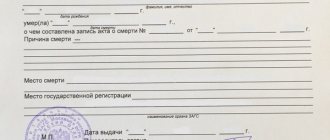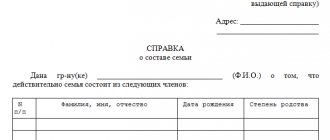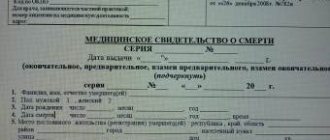What to do if a person dies at home
Call emergency services by calling 02 (102) and 03 (103) or by calling the single emergency number 112. After calling emergency services, call a funeral agent from the city's specialized funeral service.
You can call an agent of the city specialized service Ritual.ru by calling. If you have not chosen a reliable funeral service in advance, we recommend that you read the memo “How to accurately choose a funeral agency.”
The ambulance will record the fact of death and send the body to the morgue. Also, emergency personnel can provide first aid and save a person who, as it seemed to his relatives, has already died.
Specialists from the city's specialized funeral service will advise relatives of the deceased on funeral issues and protect them from scammers (black agents).
Important!
- Transportation of the deceased to the morgue is carried out free of charge by the city service.
- If you are organizing the funeral yourself, be sure to find out and write down which morgue the body will be delivered to.
Funeral arrangements
If a person died in hospital
If a person died in a hospital, then it is necessary to call a funeral agent from the city funeral service. There is no need to call an ambulance - if the hospital reports that a person has died, then, unfortunately, resuscitation procedures will no longer save him. The hospital doctors themselves will transfer the body of the deceased to the morgue.
Important! When calling the funeral service, write down the personnel number and name of the agent. Upon arrival, be sure to check the details. Do not open the door to people whom you did not call and who introduce themselves as ritual agents - in 90% of cases they are scammers.
Basic operations when registering death
The death of a person in a hospital is an ordinary situation that happens for various reasons. There is only one outcome - an irreparable loss, which is very difficult to come to terms with. To make the task easier for the relatives of the deceased during this difficult time for them, the storage and washing of the body is undertaken by the staff of the medical institution. According to Russian legislation, the death of a patient in a hospital is considered an insured event. The doctor or nurse must explain to the relatives of the deceased where and when they need to appear to comply with the prescribed formalities.
If a person died in a hospital, workers are required to record the date and exact time of death. If they did not do this or hid the fact of death from their relatives, a criminal case may be opened against them under the relevant article of the Criminal Code of the Russian Federation.
Without fail, the deceased is transferred to the pathology department available at the organization. If it is not there, then the body of the deceased is sent to the nearest morgue. The autopsy examination is prescribed by the attending physician who observed the patient’s condition in the last hours of his life. Please note that you may refuse to undergo this procedure. The exception is signs of violent death. In this case, the opening stage is mandatory.
Now let's talk about what measures the relatives of the deceased need to take after the news of his death. The first step is to visit the morgue. Before your visit, prepare the following set of things:
- underwear, hosiery (should be easy to put on, the material should be dense and durable, the color should be discreet);
- clothes for burial (for men - a business suit with a shirt and tie, for women - a modest dress below the knees without a pronounced neckline);
- personal hygiene items (disposable razor, comb, bar soap, small towel).
- perfume (eau de toilette or cologne is brought upon request, which morgue employees have no right to prevent).
Clothes must be clean and ironed. The cut, color and style are selected in accordance with the professed religion. If faith requires the presence of a headdress, shroud and other items, they must also be handed over to the employees of the institution. Do not forget to check the date and time of release of the body, as well as obtain a medical certificate of death.
The personal belongings of the deceased, which he used during his lifetime, must be taken away. They are kept until required in the department of the hospital in which he died.
Draw up an agreement for the provision of funeral services
If you need to refuse an autopsy - write a statement
If, for religious or other reasons, the relatives of the deceased want to refuse an autopsy, then they need to write a statement to the morgue. It states:
- Applicant's passport details.
- Passport details of the deceased.
- Reason for refusal to open.
An autopsy can be refused only if there is no suspicion of violent death. The morgue accepts a refusal in one of the following cases:
- The deceased died under the care of doctors, and the disease was established.
- The deceased did not die in the hospital, but the outpatient record indicated an illness that could have led to death.
- If the deceased died from cancer and there are results of histological analysis.
Funeral benefit 2021, how to receive payments upon the death of a relative
- for social benefits the amount is fixed and known in advance;
- for compensation - the amount depends on the actual costs incurred, which must be properly confirmed, and also - there are maximum restrictions;
- for a benefit in the amount of a three-month salary or pension - depends on the last amount of salary or pension received before death, is not limited by an upper limit, does not depend on the actual costs of the funeral (but at the same time it may be even less than the usual social benefit).
Inform the relatives and friends of the deceased about what happened
Many relatives, friends and colleagues of the deceased will want to attend the funeral - this is the last opportunity to say goodbye to the deceased. So that the ceremony does not come as a surprise to those wishing to say goodbye to the deceased, inform them immediately about what happened.
Funeral dates according to confessional canons:
- Christians and Buddhists bury on the 3rd day after death.
- Muslims and Jews bury on the day of death (24 hours after death).
Condolences
Send online
Send online
Activities on the anniversary of Orthodox funerals and private memorial days
When a year has passed since the death, a note of repose is submitted to the church. It is important not only to write the name of the deceased in the note, but also to prayerfully participate in the service. Around the same time, a permanent monument is erected at the grave of an Orthodox Christian, which has the shape of an eight-pointed cross or contains its image, relief or engraved. The date of death is observed annually as a private memorial day with a special prayer service. In addition, such dates are the birthday of the deceased and the day of his Angel.
Obtain a medical death certificate
The first document you need to obtain for organizing a funeral is a medical death certificate. It can be obtained from the morgue where the body of the deceased was taken. To do this, you must submit to the morgue registry:
- Passport of the deceased.
- Passport of the applicant (funeral organizer).
- Hospital card of the deceased.
- Health insurance policy for the deceased.
Having received a medical death certificate, those wishing to have a Christian funeral service must make a copy of the document - this will be needed when ordering a funeral service in a temple (church).
Important! Obtaining a medical death certificate and collecting all subsequent documents can be entrusted to a funeral agent.
MORTUARY and hospital
Having recorded death, the doctors themselves send the deceased to the mortuary.
If doctors suspect a criminal nature of the death, the body is sent to the forensic medical morgue. The funeral procedure may be delayed due to the autopsy.
If they called you to inform you about the death of a relative, and added that the body needs to be transported to the place of final registration, call the Compulsory Medical Insurance Fund and complain about the violation. Again, for those who have not read our previous article with recommendations in the event of the death of a relative, we note: you should not be charged a penny for storing and washing the body - this is all an insured event, which is paid by the same Fund. They will only ask you for money for services that go beyond the basics: for example, hair and makeup for the deceased. Along with the money, you need to transfer the necessary things (adjusted for the gender of the deceased):
- underwear;
- socks/stockings/tights;
- clothes (suit with shirt, tie, sweater, dress, etc.);
- machine for shaving;
- comb;
- soap;
- small towel;
- cologne/eau de toilette.
At the MORTUARY, you set a time for the body to be released and pick up a medical report (certificate) of death. Don’t forget to visit the department where your loved one died and pick up the deceased’s personal belongings and his passport from there - it’s best to do this in the first half of the day.
Then everything follows the same algorithm as usual.
Receive a stamp death certificate and certificate #11
The main document in organizing a funeral is the stamp of death certificate.
A stamped death certificate can be obtained from the registry office or the MFC. You should contact the institution located:
- In the area where the deceased lived.
- In the area where the morgue is located where the deceased was taken.
Required documents
You need to contact the MFC with the following documents:
- Passport of the applicant.
- Passport of the deceased.
- Medical death certificate.
Together with the stamp certificate, a certificate in form #11 is issued. It is necessary to receive funeral benefits.
Important! At the MFC, check whether you have received a certificate in form #11. If not, contact staff immediately to obtain it. Without this document it is impossible to receive funeral benefits.
Get a place in the cemetery
If the deceased is registered in the same city where he will be buried, the place can be obtained free of charge by law. But often free new places are only available in cemeteries open for new burials and often in remote ones: those located within the city are already closed for new burials.
Family burials can be carried out if there is a family grave where a close direct relative is buried and 15 years have passed since the last burial with a coffin (sanitary period).
Other ways to quickly and officially get a place in a cemetery:
- purchasing a family (ancestral) plot at an auction of the Moscow Government (if you are planning a funeral in advance);
- directly through the Moscow Department of Trade and Services 1 day in advance, if death has occurred and a place must be obtained urgently;
- purchasing a cell in a columbarium in 1 day.
How much does burial work cost - digging, installation/dismantling of the tombstone and fence?
The open cemetery space itself is free, and any attempt to sell it is illegal.
You need to pay at the time of burial for the following work:
- digging a grave during burial in a related grave. Digging a grave in case of ordering a free funeral according to a guaranteed list of services and goods for burial is free. When buried in a related grave, the cost of digging a grave is about 10,000 rubles (a little less in summer, a little more in winter);
- installation/dismantling of tombstones, crosses, fences, cutting down trees, etc. The cost of this work depends on the composition and complexity of the services and can cost several tens of thousands of rubles.
Funeral agency
When to turn to funeral agents for help is up to you. This can be done either first or last. The minimum set of funeral agency services includes:
- ordering a coffin according to individual sizes, selecting an urn;
- purchasing wreaths, renting a hearse;
- ordering a monument, decorating a grave.
Representatives of the funeral company also take care of all practical concerns related to the preparation of documents, hiring movers at the funeral, choosing a place for the funeral service, organizing funeral dinners, etc. A complete list of services and their costs can be clarified by contacting a representative of the funeral agency in person.
Organize a farewell ceremony
The ritual includes several stages, and the choice of specific ceremonies depends on the wishes of the family - for example, whether they want to carry out any religious rituals or not, what denomination they belong to. Typically there are three stages:
— farewell (for example, a civil memorial service in a rented ritual hall at the morgue or a funeral service in a temple);
- burial;
- wake.
It is important to decide in advance how, when and where each stage of the ceremony will take place, and to inform the relatives, friends and colleagues of the deceased about this. You need to think about transport in advance - rent a hearse and a hearse bus to transport the coffin and those saying goodbye. With the wake, you need to decide whether it will take place at home or in a cafe. In the latter case, you need to rent a place for the funeral.
Cemetery administration
Here you need to contact someone who will subsequently take care of the burial - install tombstones on the site, bury other relatives, etc. True, it will always be possible to re-register the burial in the name of another person: usually there are no problems with this. Here they issue an invoice for digging a grave and issue a passport for the future burial: it indicates the person in charge, the site number, full name. buried and some other important information.
When you have resolved all these issues, as well as questions about organizing a wake (at home or in a cafe), the body can be collected: usually this happens a day after the death.
September 29, 2021 Documents
previous entry
Technically impossible methods of executing monuments
next entry
Subburial in a related grave: terms and procedures
We have already told you what to do if a person dies at home. But what if it happened in a hospital? Who is responsible for sending the body to the mortuary, and where can you obtain the deceased's personal belongings and passport? What will you need to pay for, and what will the Mandatory Health Insurance Fund pay for?
Take clothes to the morgue
Take everything you need to the morgue: clothes (underwear, long sleeves) and shoes for the deceased, perfume accessories. For simple preparations for farewell (washing, dressing and placing in a coffin), the mortuary has no right to charge money, as well as for storing the body for a week. Only some services may be paid: for example, if a person died in an accident and serious defects need to be hidden. Next, you need to buy everything for the funeral: a coffin (it’s even needed for cremation), wreaths, a blanket - and order transport.
Are there any benefits for burial?
Everyone is entitled to a funeral benefit. If the person worked, you can get it from the accounting department. If you were a pensioner, go to the regional office of the Pension Fund; if you were unemployed, go to the Social Security Administration. You must apply for benefits no later than six months after the funeral. True, it is tiny - about five thousand rubles. In some regions there is an additional payment to this amount: for example, in Moscow it is 11 thousand rubles. If a disabled person or war veteran dies, the benefit should also be higher than usual. In addition, according to the law, a funeral can be held free of charge - if the deceased did not work or was a pensioner. To do this, you need to contact the social security department of your area with a death certificate and passports: yours and the deceased’s.






